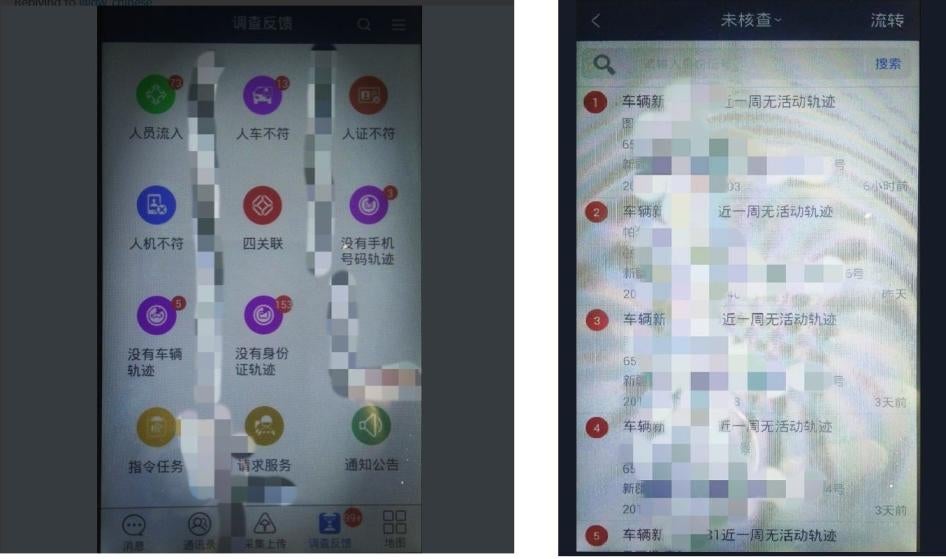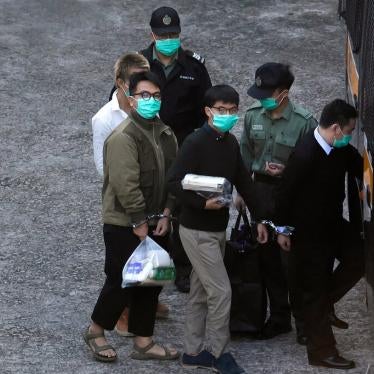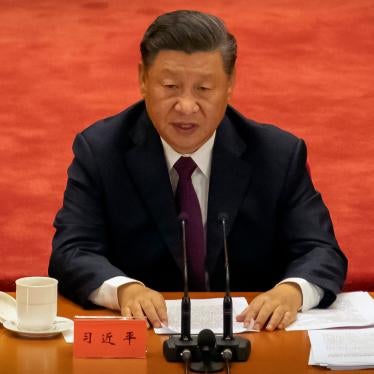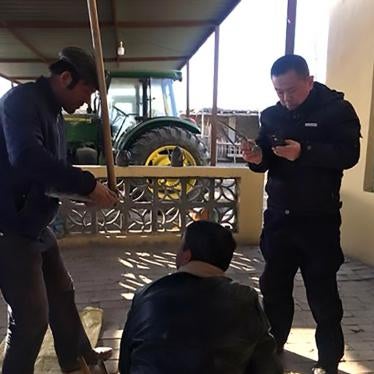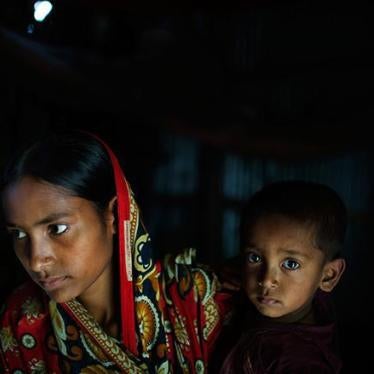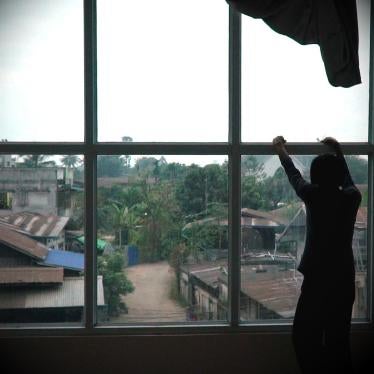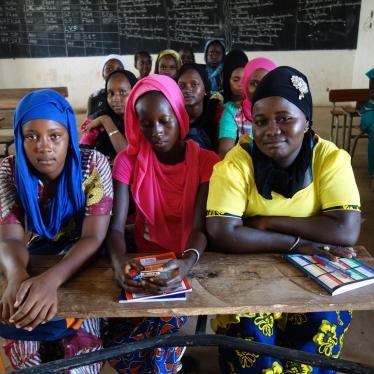(ニューヨーク) 中国新疆ウイグル自治区の取締りに用いられるビッグデータ・プログラムによって、トルコ系ムスリムが拘禁検討対象として恣意的に標的にされていると、ヒューマン・ライツ・ウォッチは本日発表した。ヒューマン・ライツ・ウォッチは同自治区アクス県住民2千人以上の被拘禁者リストを入手。このリストは、ムスリム住民の弾圧に中国政府が先端テクノロジーを用いていることを改めて明らかにするものだ。
「統合ジョイント・オペレーション・プラットフォーム」(IJOP、一体化統合作戦プラットフォーム)と呼ばれるこのビッグデータ・プログラムは、この「アクス・リスト」に名前のある人びとをマークしたとみられる。当局は、このマークされた人びとを評価対象とし、新疆の「政治教育」収容所(新疆ウイグル再教育キャンプ)に送った。
「このアクス・リストは、中国政府が行っている新疆のトルコ系ムスリム住民への残忍な弾圧をテクノロジーが加速している現実をいっそう明らかにするものだ」と、ヒューマン・ライツ・ウォッチの中国担当上級調査員の王松蓮(マヤ・ワン)は述べた。「中国政府はリストに掲載された人びとの家族に回答する責任がある。拘束理由や現在の居場所を。」
ヒューマン・ライツ・ウォッチがIJOPの実態について初めて明らかにした2018年2月、この取締りプログラムは、新疆ウイグル自治区の様々なセンサーシステムから住民データを収集し、脅威になる可能性があると判断した人びとをマークして当局者に通報していると指摘した。通報をうけた当局者は、対象者の「行動全体」を他の情報源と合わせて評価し、一部を政治教育収容所などの施設に収容している。ヒューマン・ライツ・ウォッチは2019年5月、IJOPのモバイルアプリを「リバースエンジニアリング」し、この大規模監視システムがマークする対象となる行動の基準が不適切で、多くの合法的な行動が含まれていることを指摘している。
2018年後半日付の「アクス・リスト」は、別の流出ファイル「カラカクス・リスト」(新疆ウイグル自治区カラカシュ県当局から2020年2月に流出したリスト)と似ている。カラカクス・リスト(この人びとは海外に親族がいることを理由に拘禁された)は、当該個人の拘禁を継続すべきかを評価する内容だ。カラカクス・リストでもIJOPが何度も言及されている。2つのリストを合わせると、当局は強制的な思想改造の標的とする人びとを選び出しており、審査する過程における新疆の官僚機構の2つの側面がわかる。人びとの拘束の決定と拘束継続の判断だ。いずれのステージでも、IJOPは当局者の対象者選定を支援する。
アクス・リストにある「Tさん」のエントリを見ると、このプログラムのアルゴリズムが合法的な行動を拘禁の根拠としていることがはっきりわかる。これによれば、この女性が拘禁されたのは、IJOPによって「警戒対象国とのつながり」があるとしてマークされたためだ。それによると、Tさんは2017年3月に国外の電話番号と4回通話したことが秒単位まで報告されている。つまり、IJOPシステムは、特定の行動、ここでは国外との通話をピックアップして、正確な通話時間を記録するようにプログラムされているのだ。ヒューマン・ライツ・ウォッチはその番号に電話をかけ、それがTさんの妹のものであることを確認している。
Tさんの妹の話では、新疆警察がTさんを尋問したのは、アクス・リストが氏の拘束日を記録した頃だった。新疆警察は、Tさんの妹が海外に住んでいることから、特に妹のことを尋ねていたという。Tさんの妹はそれ以来、新疆にいる家族とは直接連絡を取っていないが、仲介者を通じて、Tさんは、週5日は工場で働き、週末だけ家に帰れるようになった(おそらく政治教育収容所から釈放後のことと考えられる)と聞かされた。Tさんの妹は、Tさんがみずからの意思に反して工場勤務を強制されていると考えている。Tさんは拘束される前に別の職業に就くための訓練を受けていたところだったからだ。
ヒューマン・ライツ・ウォッチがアクス・リストを分析したところ、IJOPシステムによってマークされた人びとの大半は、日常的で合法的な非暴力行動を理由に拘禁されていることが強く示唆された。このことは、IJOP のような「洗練された」「予測可能な」テクノロジーが、「正確に」犯罪者を「的を絞って」新疆の安全を確保しているとする中国政府当局の主張と矛盾する。
新疆ウイグル自治区のトルコ系ムスリム住民への大規模監視と恣意的拘禁は、中華人民共和国憲法と国際人権法が定める基本的権利の侵害だ。中国憲法第37条は「いかなる公民も、人民検察院の承認若しくは決定又は人民法院の決定のいずれかを経て、公安機関が執行するのでなければ、逮捕されない」と定めている。
しかし、ヒューマン・ライツ・ウォッチの調査によると、検察も裁判所も関与していないとみられる。むしろ、警察官などの行政当局者のみが、誰を拘禁するかを判断する唯一の決定者である。拘禁されている人びとには適正手続きが保障されず、弁護人や家族との接触や、裁判を通じて容疑に反論する機会もない。個人の住居の内部や周辺なども対象とする監視システムの使用も、個人のプライバシー権を侵害するものだ。
「実際のところ、『予防的取締り』プラットフォームは、中国政府がトルコ系ムスリムへの大規模弾圧を正当化する科学のふりをした隠蔽手段の一つにすぎない」と、前出の王調査員は指摘する。「中国政府は直ちにIJOPを閉鎖すべきだ。そして収集した全データを削除し、新疆で恣意的に拘束されている人びとをすべて釈放すべきだ。」
アクス・リストの詳細
The Aksu List: Authentication
In August, Radio Free Asia’s Uyghur Service provided Human Rights Watch with an Excel spreadsheet titled “List of IJOP Trainees” with the names of over 2,000 people obtained from an anonymous Xinjiang source in late 2018. The sheet has columns that include the person’s name, gender, the date of their detention in a political education camp, the reason for their detention, the number of their detention facility or cell, the batch number from which the IJOP systems picked them out, and the reason why, usually no more than a sentence or two.
Although the sender has not been identified, the list appears to come from a part of Aksu prefecture where 80 percent of the residents are Uyghurs. Human Rights Watch is confident that all the people on the Aksu List are Uyghurs. About half of the list are men and the other half women. Their detention dates ranged from mid-2016 to late 2018. At the peak, well over 100 people were detained on a single day. To protect the source, Human Rights Watch is obscuring the precise location of the Aksu List, precise dates, and some of the numbers throughout the analysis.
The file’s metadata suggests that it was last modified in late 2018. Human Rights Watch used various methods to verify the Aksu List:
- Human Rights Watch shared the Excel sheet with Uyghur diaspora communities from that region, who identified 18 names on the list as their immediate family members.
- The list also contains nearly 200 unique ID numbers, which were checked against the ID numbers on an official website of people who have been blacklisted under China’s social credit system, run by the Supreme People’s Court; and two of those numbers matched. The rate of 1 percent is consistent with the matching rate of those in the Karakax List, which contained more identifying personal information for extensive verification.
- Some entries say the individual was detained in a camp after completing a prison sentence, and 20 list the crimes. Human Rights Watch searched the Supreme People’s Court’s database of Chinese court verdicts for these 20 people’s full names, but it did not yield results, though the court verdict database is far from comprehensive.
- The Aksu List also contains 27 unique Chinese mobile phone numbers. Human Rights Watch was able to find 14 of them on WeChat. In most cases, their photos, names, and locations indicate that they are Uyghurs from Aksu.
- The Aksu List contains two mobile phone numbers from outside China. One is still functional and, as noted, the person who picked up the phone confirmed she is the sister of the woman on the list we have called Ms. T.
The language and terms used in the Aksu List are also consistent with those in other Xinjiang official documents that Human Rights Watch reviewed. Human Rights Watch has shown the full Aksu List to two experts who have extensively documented Xinjiang’s repression. They determined that the list appears authentic based on details such as detention duration and the language used.
The same Xinjiang source who provided the Aksu List also provided other audiovisual content to Radio Free Asia’s Uyghur Service between mid and late 2018. Human Rights Watch analyzed this material to assess the credibility of the Excel spreadsheet, as it was obtained from the same source.
To protect the anonymous source, Human Rights Watch will not describe specifics of the analysis performed, but concluded that the audiovisual content was taken from inside a detention facility in Aksu. The embedded geographic coordinates suggest that they were taken from within a large building complex previously identified as a political education camp by the Australian Strategic Policy Institute, a think tank. This analysis provides Human Rights Watch with additional confidence in the authenticity of the Aksu List.
The Aksu List: Analysis
According to the Aksu List, the IJOP can flag people at both the prefecture and regional levels, though it is unclear how, or if, those two levels of analysis differ. At both levels, most people were flagged for their relationships, their communications (通联), or for being related to (家族人员 or 亲属), or traveling, or staying with (同行同住) someone the authorities consider suspicious. Column F appears to be the reasons officials give for detaining a person. An examination of the Aksu List suggests that the authorities consider the following behavior suspicious:
- Practicing Islam in the following ways:
- Studying the Quran without state permission or allowing one’s children to study the Quran;
- Reciting the Quran, including Khitma [海提玛], the recitation of the entire Quran;
- Preaching the Quran without state permission or listening to such preaching;
- Wearing religious clothing, such as the burqa or veil, or having a long beard;
- Having more children than allowed by China’s family planning policy;
- Marrying or divorcing outside of official Chinese legal requirements; for example, marrying before reaching the legal age (22 for men and 20 for women), marrying through a Nikah (an Islamic law marriage contract), or practicing polygamy;
- Going on Hajj (the annual pilgrimage to Mecca in Saudi Arabia, considered a religious duty in Islam) without state permission;
- Performing the Hijra (伊吉拉特), a form of migration to escape religious persecution following the pattern of the immigration of the Prophet Mohammed from Mecca to Medina in 622 CE, which the authorities consider to be motivated by adherence to Islam.
- Using suspicious (or “minority” 小众) software, in particular peer-to-peer file sharing application Zapya (快牙), but also Virtual Private Network, Skype, Payeco (易联), L2TP, and imo.
- Traveling:
- Internationally to “sensitive” countries, including Turkey, Afghanistan, Saudi Arabia, and Kyrgyzstan;
- Domestically outside Aksu, including elsewhere in Xinjiang such as Urumqi and Kashgar, or to other parts of China such as Beijing and Shanghai;
- Without notifying local officials. People are also detained for having no fixed address.
- Going “off grid” (去向不明 or 轨迹不明), for example “switching off their phone repeatedly” or being missing for periods of time.
- Having mismatched identity, including using a cellphone number or ID card not registered in one’s name, having more than one hukou (residency registration), or having falsified official documents like marriage certificates. In one case, losing an ID—subsequently used by someone else—was a cause for detention.
- Having “extremist thoughts” or downloading “extremist” audiovisual content.
- Having relatives in a group the authorities have labeled as terrorist, including the East Turkistan Islamic Movement (ETIM) and a couple of Aksu local groups.
- Having previously been a target of Xinjiang government actions, such as being detained or convicted of ordinary crimes or political crimes. In one case, a man was subjected to “political education” because he had been detained in 2014 for 15 days for carrying a knife and for not “properly explaining” the incident.
- Resisting official policies or official “management.” In one case, a man was detained for not paying rent on his land.
- Being generally untrustworthy (不放心人员).
- Being young; that is, “born after the 1980s” (80, 90后不放心人员).
- “Generally acting suspiciously,” “having complex social ties” or “unstable thoughts,” or “having improper [sexual] relations.”
In some cases, the alleged “problematic” behaviors dated to years earlier, revealing broad surveillance of legal and non-violent behavior going back decades. In one case, a man was detained for having studied the Quran in the mid-80s, and having “let his wife wear a veil” in the early 2000s. In another case, a woman was detained for once going to Kashgar, and once staying overnight in Hotan, both in 2013.
The authorities listed “terrorism” and “extremism,” both perilously over-expansive terms in Chinese law, as the reasons for detaining about 10 percent (or over 200) of the people on the list. Yet the authorities did not allege that these detainees committed, incited, supported, or plotted any acts of violence, much less any acts that would rise to the level of terrorism. About one in five in this group were tagged for downloading or sharing “terrorism” or “extremism” content. About four in five were listed as being related to someone who had downloaded or shared such content, or to someone who was detained for terrorism or extremism. The Aksu List does not provide any additional information on the content of such audiovisual materials.
Governments may prosecute speech that incites criminal acts—speech that directly encourages the commission of a crime, is intended to result in criminal action, or is likely to result in criminal action—whether or not criminal action does, in fact, result. But laws that impose criminal punishment for what has been called “indirect incitement”—for example, justifying or glorifying terrorism—encroach on expression protected under international human rights law.
An examination of the Aksu List suggests that Xinjiang’s Turkic Muslims are presumed guilty until proven innocent. In one case, a man was sent to political education camp because “suspicion [of him] cannot be eliminated and would require further interrogation.” The evidence suggests that, consistent with official rhetoric, political education is akin to a form of preventive detention, where people’s behaviors are deemed vaguely suspicious but not criminal. They are being held until their loyalty can be ascertained and, as needed, instilled.
Notably, three cases in the Aksu List suggest that people are treated with different levels of “strictness” depending on their level of obedience, and that people who disobey or “talk back” are placed in areas with stricter management. There appear to be three levels: “common management” (普管区), “strict management” (严管区), and “strong management” (强管区). The list also shows that some people are allowed to return home when they are sick (or in one case, breastfeeding), but are sent back to detention once they regain their health.
Human Cogs in the Machine
Previous Human Rights Watch research suggests that the IJOP system’s requirements for officials to respond to many perceived abnormalities in people’s lives is grueling. In mid-2019, Human Rights Watch was able to speak with an official in the region involved in carrying out the IJOP system. The person said:
From 2016 to mid-2018 we were arresting people. In the beginning we were arresting those who spread terrorism videos, those who receive or give funds to ETIM, [and] those who participated in riots, and we would send them to the local political education centers. Later on … there were quotas for arrests in all the locales, and so we began to arrest people randomly: people who argue in the neighborhood, people who street fight, drunkards, people who are lazy; we would arrest them and accuse them of being extremists. There was not enough room for them all in the centers, so they built new ones.…
In the beginning when the IJOP system came live, if [we] labeled someone as suspicious during evaluation, the local village committee and the police would go and take the person into custody. Later on, we rarely marked someone as suspicious. Often … we asked them leading questions. Let’s say we had to evaluate a person whom the system had lost track of. We’d [go to his home and] ask, “these last few days you were working the fields? You didn’t go anywhere?” As long as they said yes, we’d fill out [the form in the app] noting the villager said he was working in the fields, he didn’t go anywhere but everything was fine. It was like that for all other verification tasks.”
The use of automation—which the authorities claim helps them identify those harboring the “ideological virus” of being disloyal to the Chinese Communist Party in a thorough and “precise” manner—can also lead to sloppy policing. The official said:
[W]e wouldn’t be able to finish the many verification tasks if we were to go through them all seriously.… But because we’ve been working [like this] for so long, whether it is our conscience or that we are tired, right now what’s left [among officials] is just grievances and complaints; everyone wants to leave, nobody is doing this work properly.
Mission Creep
Information that has recently come to light from 2018 and 2019 suggests that the IJOP is used not only for picking out targets for detention, as described in the May 2019 Human Rights Watch report, but also to provide data for Xinjiang’s larger government information system, that powers a range of government functions. This suggests that the authorities are increasingly sharing personal information across government agencies.
Government reports state that data collected via the IJOP system is also being used for a variety of vetting tasks, from screening applicants for police jobs or public services such as poverty alleviation programs, to picking out model Communist Party members. Neither the initial collection of personal data nor the sharing and use of such data involve asking for consent, illustrating how powerless Xinjiang’s residents are.
In Turpan County, for example, officials vet people using the IJOP system to select politically reliable people to take part in a “labor transfer” scheme; a program that involves organizing and transporting groups of Uyghurs to work in factories elsewhere in China under closely supervised, and often coercive, conditions. The same Turpan County scheme also draws on information gathered from “Physicals for All,” another compulsory data collection program in which medical and health data is collected.
The integration of the IJOP system with other government systems, illustrates China’s expansive definition of security and perceived need for extensive surveillance and control. In Xinjiang, the IJOP system is connected to information databases on second-hand cars, allowing the authorities to “compare information between persons and vehicles in real time, to discover suspicious clues in a timely manner, and to use information technology to effectively eliminate and prevent criminals from using second-hand vehicles to engage in various criminal activities that endanger the safety of society, as a publicly-available Xinjiang Department of Commerce notice says.” The notice further explains:
Each automobile trading hall in our region is equipped with ID card recognition devices and video image capture systems to examine the ID cards, residence permits, community certificates, convenient contact card, vehicle information … of both buyers and sellers, to ensure that the person and their identity match. The information is uploaded to the Xinjiang Traffic Police Headquarters in a timely manner.
There is some preliminary evidence that the IJOP system itself is being used in China outside of Xinjiang. China Electronics Technology Group Corporation (CETC), the same company that built the IJOP in Xinjiang, built an IJOP system in Yinchuan, the capital of Ningxia province, says a procurement document dated January 2020 (for RMB 280.98 million, nearly US$43 million). CETC did not respond to a Human Rights Watch request for comment. Ningxia has the country’s highest concentration of ethnic Hui, also a Muslim (though not Turkic) minority. While it is unclear how the system is being used, religious restrictions on Hui Muslims—closing mosques and Arabic-language schools, scrubbing Arabic scripts from Halal restaurants—have been on the rise in Ningxia and other Hui Muslim areas since 2019.

